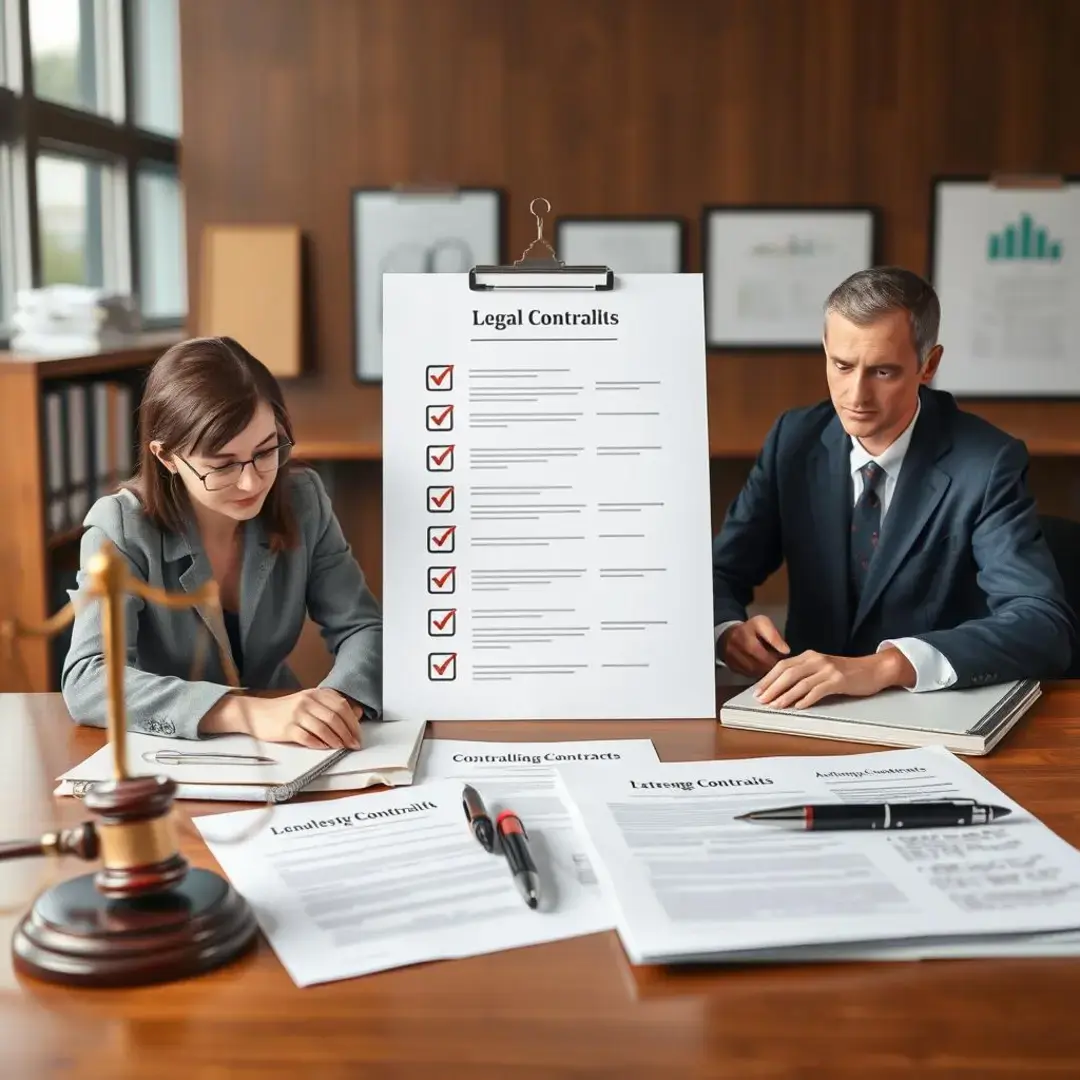Closing Your Company: Seamless Legal Transitions
Dissolution process: a step-by-step guide

Filing articles of dissolution
One of the first steps in closing your company is to file the articles of dissolution with your state government. This document officially signals the intent to dissolve your business and outlines the necessary details such as your business name, the reason for dissolution, and the effective date. It is crucial to meet all state requirements to avoid any complications during the enforcement of your dissolution.
Each state has its own rules regarding the dissolution process, and it is essential to familiarize yourself with these. Research the specific provisions required in your state, as non-compliance could lead to fines or an extended process. Make sure all necessary forms are completed accurately to facilitate prompt processing.
Ensuring that all outstanding fees and taxes are paid is another critical step. This means clearing up any debts your company may have incurred before signaling an official closure. Failing to do so may result in legal complications later on, so creating a checklist for outstanding obligations can significantly streamline this process.
Liquidating company assets
The next logical step involves liquidating your company assets. This can take many forms, from selling physical items to managing intangible assets, all of which should be approached with a strategic mindset. Liquidation needs to be handled carefully to maximize returns and ensure that all assets are accounted for.
For physical assets, consider hosting an auction or sale to maximize profitability. Items can range from office equipment to inventory, all of which should be appraised fairly. Selling these assets timely and efficiently not only helps recover some losses but also makes it easier for you to settle any outstanding debts.
intellectual property requires careful management during this phase, as this can represent a significant portion of your overall business value. Evaluate whether it’s best to sell, license, or simply relinquish rights. Properly documenting your intellectual property rights will also protect you from future challenges or claims.
Notifying stakeholders
Communication is key in any business closure, particularly in notifying stakeholders. This includes informing employees, customers, and creditors about the dissolution in a professional and empathetic manner. Being transparent about your reasons for closing can go a long way in maintaining relationships with these critical groups.
It’s essential to have one-on-one conversations with your team and inform customers via email or direct communication. Offering assistance, such as references for future jobs or providing an explanation of the closure’s impact on them, can soften any resentment and preserve your professional reputation.
Lastly, addressing your creditors is vital to ensure that all debts are settled amicably. Set up meetings to discuss payment plans or negotiate any outstanding agreements to avoid legal ramifications down the line. Transparency during this phase can considerably ease tensions and establish goodwill.
Legal considerations for a smooth closure

Understanding tax implications
Understanding the tax implications of closing a business should not be overlooked. Tax responsibilities may vary based on your business structure and state laws, making it crucial to seek expert advice. Be prepared to address these obligations promptly to avoid penalties.
Filing final tax returns is mandatory, and ensuring these submissions are accurate is fundamental. This includes both federal and state tax returns, as any mistakes could lead to further audits or liabilities. Consulting a tax professional can help navigate these complexities and provide peace of mind.
When closing your company, the possibility of being audited should not be ignored. Maintaining accurate records and being prepared for any queries from tax authorities will ensure a smoother transition and minimize hassle. Keeping detailed accounts for several years post-closure is wise, as audits can take time to resolve.
Compliance with regulatory bodies
Every industry has its own set of regulations that must be adhered to upon closure. Compliance with these regulations can prevent potential legal troubles and ensure that you finish your business obligations properly. Being proactive about understanding these requirements is essential for a successful closure.
Research industry-specific regulations to ensure all aspects of your business are compliant. Depending on your sector, there may be licensing obligations and reporting requirements to meet. Ensuring all documentation is complete is not just a legal obligation; it speaks volumes about your professional integrity.
Don’t forget to submit any necessary documentation to the relevant authorities to finalize your closure. This may include employee benefit documents, licenses, and compliance reports. Keeping organized records will ensure that nothing is overlooked during this critical phase.
Handling outstanding contracts and liabilities
Outstanding contracts pose another area needing careful attention. It is essential to review any ongoing contractual obligations to ensure that they are terminated or modified appropriately. Managing these contracts responsibly will help mitigate any liabilities post-closure.
While terminating contracts, a thoughtful negotiation approach is vital. Maintaining a respectful dialogue with your contractual partners will go a long way in preserving business relationships and ensures that formal terminations are executed smoothly.
Addressing potential lawsuits or claims requires vigilance. If there are unresolved disputes or grievances, settling these before closure will save you time, costs, and headaches down the line. Legal counsel should be consulted for guidance on protecting yourself from any possible litigation.
Post-closure best practices

Maintaining records for future reference
Once your business is officially closed, keeping organized records becomes an essential task. This includes financial documents, contracts, and employee information necessary for future reference. Overall, having a well-structured archive will serve you well should questions or issues arise down the line.
Organize financial documents in a manner that allows easy access in case of audits or inquiries. Maintaining clarity in your financial records will simplify any necessary future reference and uphold a professional standard of record-keeping, ensuring no details are lost.
Likewise, preserve legal agreements related to the company’s operations, as these may come in handy in legal discussions or clarifications in the future. Retain copies of all significant contracts that were executed, even if they are no longer active, to protect your interests.
Addressing potential inquiries
Even after closure, you may find yourself fielding inquiries from various parties, including government agencies or former clients. Having a strategy in place for how to handle such inquiries is crucial for maintaining professionalism and mitigating any reputational damage.
Be prepared to respond promptly and accurately to requests from government agencies. Remaining cooperative will prevent any misunderstandings and pave the way for a smoother post-closure experience. Adequate responses reflect your professionalism, preserving your reputation as you transition.
Engaging with former clients is also essential, as their opinions can significantly influence your reputation. Keeping them informed and acknowledging their support can lead to goodwill even after your business ceases operations. Maintaining these connections can open doors for future collaborations or opportunities.
Minimizing the impact on your professional reputation

Communicating transparently with stakeholders
Throughout the entire dissolution process, transparent communication with stakeholders is essential. Providing clear and honest explanations will mitigate misunderstandings and foster goodwill. Don’t underestimate the power of transparency in preserving your professional reputation during difficult times.
When announcing the closure, detailing the circumstances that led to this decision can help stakeholders understand your journey. People appreciate honesty, and being upfront about your situation builds trust and respect. This approach can soften the blow of the closure and leave everyone with a sense of closure.
Ensuring that your professional relationships remain intact during this transition is crucial. Networking and personal connections you have developed over your entrepreneurial journey can provide a cushion for future ventures. Nurturing these relationships may lead to collaboration opportunities or assistance down the road.
Planning for future ventures
Lastly, while closing one chapter, it’s essential to look ahead and plan for future ventures. Use this opportunity to reflect on the lessons learned and the skills gained throughout your experience. Every closure can be a stepping stone toward the next great opportunity.
Think critically about what you learned from your startup journey. Identify the strengths and weaknesses that surfaced during this time and how you can utilize this insight going forward. This reflection can help inform your strategy in any subsequent projects and lead to better outcomes.
Embrace the change and explore new ideas, businesses, or innovations that spark your interest. Use your experiences to identify gaps in the market or new technological applications. By maintaining a proactive outlook, you can turn challenges into exciting new ventures.
Closing your company does not have to be a negative experience. With the right approach and understanding of the necessary processes, you can ensure a legal and professional closure that preserves your reputation and prepares you for whatever comes next. Remember, every ending can lead to new beginnings.












